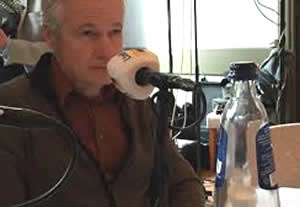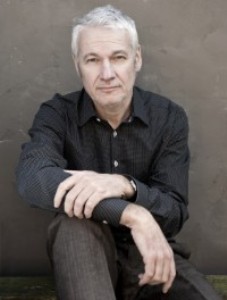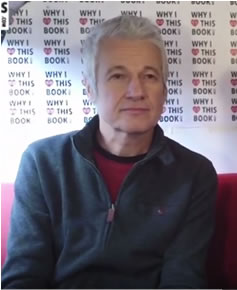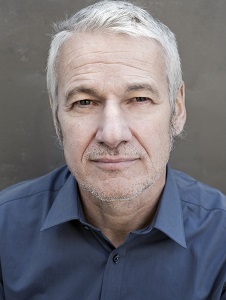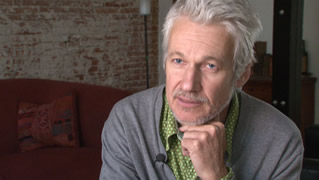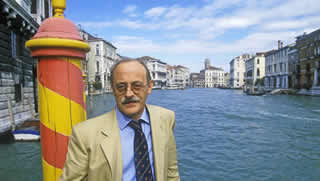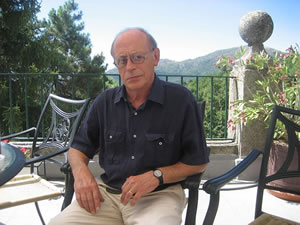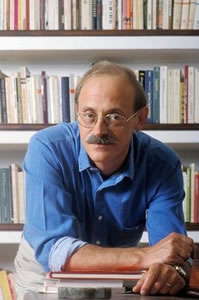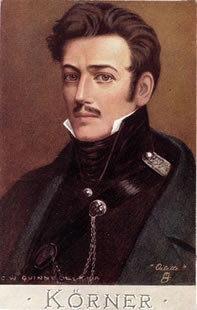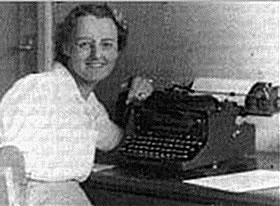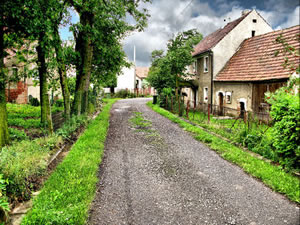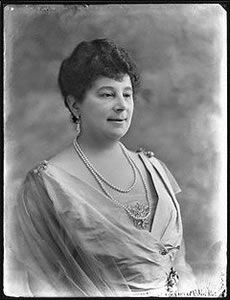De Nederlandse dichteres en schilderes Inge Boulonois werd geboren in Alkmaar op 23 september 1945. Zie ook alle tags voor Inge Boulonois op dit blog.
Ode aan de kastanje
Oktober. Dagen zijn mistgrijs gekleed
en wilde kastanjes vallen maar raak.
Hun boom een kerel, zijn dos vol
groene stekelbollen. Als dobbelstenen
rollen ze weg, hun hoop gericht op boomhoog.
Onweerstaanbare pralines,
rap door kleine handen opgeraapt,
binnen als schat verloren gelegd –
dood in minder dan een winter.
Herfsttijd kreupelt weken door.
De zon bindt in, het loof gloeit na
totdat het oud en bruin wordt afgelegd,
de boom bloot naar zijn wortels keert
om zo kou te weerstaan.
Alsof het niets is, schept de kastanjeboom
na wintertijd als eerste nieuw blad. Lentekanjer –
Zoals het meestal wordt
Of misschien ook niet:
hij baart geen opzien meer in huis,
noch ik. Een zin kromp in.
Het harde bed blijft vierkant staan
net als de nieuwe oude tafel.
Bezetten we de overkant van ik
of ik en blazen nog wat zeepbellen.
Ik luister naar het raam of kijk
me buiten weg, volg aandacht
die steeds kruimels van het blad schuift.
Een opgewekte vogel pikt
soms in mijn ribbenkast.
We blijven zitten waar men zat.
Omdat. De suiker roert zich
gillend door de koffie –
Hooimaand
‘t Is niet te harden zonder parasol
Al kost gezeul met gieters mij steeds uren
Mijn gras blijft geler dan bij alle buren
Catalpa’s houden herfstgloed in hun bol
Maar ’t ergste vind ik nog die enge look
Van mannenbenen in een korte broek
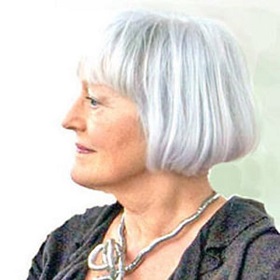
Inge Boulonois (Alkmaar, 23 september 1945)
De Italiaanse schrijver, vertaler, en literatuurwetenschapper Antonio Tabucchi werd op 23 september 1943 geboren in Pisa. Zie ook alle tags voor Antonio Tabucchi op dit blog.
Uit: For Isabel (Vertaald door Elizabeth Harris)
“He dug in his pocket and pulled out a bunch of keys. The only ones who come here are Chinese, all of them with birdcages, he said, following a logic that escaped me, they each have a little songbird in a cage and they’ll get their bird to converse with their neighbor’s bird, and this is how it’s done in China, the birdies chatter and make friends, and so their owners also make friends, and they, too, get to talk. He paused and stared at me, looking distressed. But you don’t have a birdcage, he went on, and there’s no one else here with a birdcage, the only ones left in the garden are two old Mahjong players who’ll leave by the smaller gate, what else is there for you to do here now, except run into bats? I need to get into the cave tonight, I insisted, you know, friend, you might say it’s part of my destiny, that destiny the stars steer, you yourself believe in the stars, please let me stay, I’ll leave by the smaller gate, too, let me stay, please, maybe that half-blind poet of the sixteenth century will even help me out tonight, here in this garden that smells of magnolias. The gatekeeper looked at me with something like pity. This garden doesn’t smell of magnolias, he replied, this garden smells of piss, because all the Chinese piss on the trees, they’re too lazy to go to the bathrooms we installed near the fountain, and so this garden stinks of piss. Very well, I agreed, under the light of that star which guides my terrestrial journey, I’ll remain in this garden that stinks of piss; it’s true, I haven’t brought any birds in a cage, but I’m here to follow a destiny which I’ll eventually come to know.
The gatekeeper stepped aside and handed me a small flashlight. This should help, he said, you can leave it at the outside gate when you go. I walked down the path, breathing deeply, waiting for the stink of piss, but nothing stank, a cool breeze had risen and carried the smell of the sea. Beneath a streetlamp, two Chinese were playing Mahjong, I said hello and they nodded in return. One was building superior honors, with a row of four white dragons, the other was working on a set of characters. I thought I could use both dragons and characters that night, and I headed for the cave. I was halfway down the garden path when I heard a whistle behind me from one of the players. You want to watch? he called, we don’t have anyone to watch, and Mahjong needs an audience. I signaled no with my hand and continued on my way; at the cave entrance I turned on the gatekeeper’s flashlight.”
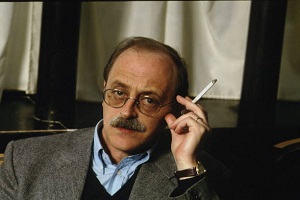
Antonio Tabucchi (23 september 1943 – 25 maart 2012)
De Vlaamse schrijver en radio-dj Tom De Cock werd geboren in Rotselaar op 23 september 1983. Hij woont in Borgerhout. Zie ook alle tags voor Tom de Cock op dit blog.
Uit: En toen kwam jij
“Euforisch en doodsbenauwd. En dan nemen we je mee naar huis.
Daar lig je dan, in je gloednieuwe babystoel op de achterbank. Die vanaf dan ook jouw achterbank is.
Onze achterbank. Van jou, van mij, en van papa.
Ja, dat lees je goed, het is beslist: hij mag de papa zijn. Dat was een cadeautje. Zomaar, onderweg in een auto ergens in Argentinië, met de zon op mijn bol en de uitgestrekte Andes als volstrekt ongeïnteresseerde getuige. ‘Jij mag de papa zijn.’
‘Meen je dat?’ En glunderen dat ie deed. ‘En jij dan?’
Goh, ja. Paps, pappie, Tom, Tokke, vake, vader, daddy, da T, Mustafa de Zesde, voor mijn part zelfs mama: couldn’t care less. Zelfs als je me consequent aanspreekt als ‘hé jeannette’ zal ik je op mijn schouders tillen en zo op de meest heroïsche tocht van mijn bestaan de Prioriteitenberg op klimmen.
Radioprogramma’s en boeken en reizen en allerlei gekke projecten aan de voet. Collega’s, kennissen, vrienden en familie bij de boomgrens. Je grootouders en je ooms en tantes zo’n beetje tussen de wolken. En hélemaal op de top, op het plekje met het mooiste uitzicht en de meeste zon, naast je papa: daar kom jij. Niet omdat dat zo hoort, maar omdat jij me gaat leren Wat Belangrijk Is En Wat Niet.
En je hoeft daar niks bijzonders voor te doen. Als ik je maar mag zien rondspetteren in bad, en schaterlachen en boos zijn en met alles spelen behalve met de karrenvracht speelgoed die je zult hebben.
Tekenen op de sofa met de dikste en meest onuitwisbare viltstift die er in huis te vinden is. Het net als we gehaast zijn vrolijk in je broek doen. Onuitstaanbaar hard een meisje zijn, of een jongen, of een beetje van allebei. Vloeken op je huiswerk. Je hart laten opblazen door je eerste grote liefde.”

Tom De Cock (Rotselaar, 23 september 1983)
De Nederlandse dichteres en schrijfster Ellen Warmond (pseudoniem van Pietronella Cornelia van Yperen) werd geboren in Rotterdam op 23 september 1930. Zie ook alle tags voor Ellen Warmond op dit blog.
Jong als kinderstemmen
Jong als kinderstemmen
reeds met de tongval van de ouderdom
te kunnen zeggen:
zie achter mij hoeveel ik al tot stof geleefd heb
en hoeveel as zich ophoopt in mijn ogen
en hoeveel stof en as mijn hand daarvan
bevatten kan en samenbalt tot niets.
en toch en desondanks
wachten – onmatig –
– want matigheid is zwakte –
en nieuwe kleren kopen voor de hoop
hoewel de laatste zekerheden naakt gaan
en trachten waar men niet bestond
toch te ontstaan
om het onmogelijk natuurverschijnsel:
zon in de maan
rondlopende weg terug
of het oog in de rug.
omdat geloof ontspringt
uit de zekerheid dat er geen hoop meer is
omdat het hart zich voedt
met wat de hand ontvalt.
Avond
Seconden lopen driftig achteruit
de dag is uit de tijd gekanteld
ik word zo stil als een strand
in een winternacht ik word
zo leeg als een uitgebrand
huis het leven staat verder
van mij af dan ik kan vertellen
leg je gezicht in je handen
en probeer je dit voor te stellen.
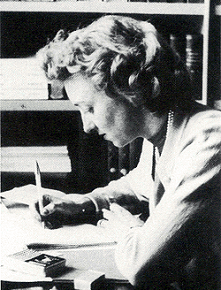
Ellen Warmond (23 september 1930 – 28 juni 2011)
De Zuid-Afrikaanse / Israëlische dichteres Olga Kirsch werd geboren in Koppies in de Oranje Vrijstaat op 23 september 1924. Zie ook alle tags voor Olga Kirsch op dit blog.
Aan die verhuisingsmanne
Dra saggies, vriende,
want sierpotte en erdewerk,
keurborde en fyn glas
sluit ’n lewe
met sy drome
en verlangens in;
Dra saggies, mededraers,
want die drag
van veerbed,
tafels, lessenaar
druk teen die bors
se dun skelet;
Dra saggies, regters,
want die oordeel
oor my klein bedryf
lê vasgevang
in prente, boeke
en ’n eie ou gemakstoel;
Dra saggies, gode,
want die hart se porselein
is broos en tot veel seer
en kwesbaarheid geneig:
die kratte van ’n lewe
kan so maklik breek.
Something died in me with your departure
Something died in me with your departure;
something ecstatic and joyfully spontaneous,
irresponsible as a spring illusion,
leaked from my being – drop by drop.
Something disappeared … Oh that I could awake
from this heavy trance, and again happiness
experience, overwhelmingly big, or choke and swallow
with sorrow! But I remain cold, untouched.
So I must resign myself, although I’m dull –
numb with longing. Because I await
everything that has eluded me, and so
much that you must replenish, that
will unfold in me like a flower on that joyful day
when you come home from afar.
Vertaald door Egonne Roth
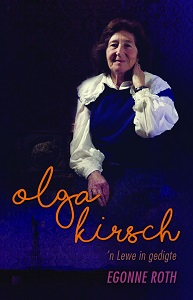
Olga Kirsch (23 september 1924 – 5 juni 1997)
Cover
De Engelse dichteres en schrijfster Mary Elizabeth Coleridge werd geboren in Londen op 23 september 1861. Zie ook alle tags voor Mary Colderidge op dit blog.
Unwelcome
We were young, we were merry, we were very very wise,
And the door stood open at our feast,
When there passed us a woman with the West in her eyes,
And a man with his back to the East.
O, still grew the hearts that were beating so fast,
The loudest voice was still.
The jest died away on our lips as thy passed,
And the rays of July struck chill.
The cups of red wine turned pale on the board,
The white bread black as soot.
The hound forgot the hand of her lord,
She fell down at his foot.
Low let me lie, where the dead dog lies,
Ere I sit me down again at a feast,
When there passes a woman with the West in her eyes,
And a man with his back to the East.
Marriage
No more alone sleeping, no more alone waking,
Thy dreams divided, thy prayers in twain;
Thy merry sisters tonight forsaking,
Never shall we see, maiden, again.
Never shall we see thee, thine eyes glancing.
Flashing with laughter and wild in glee,
Under the mistletoe kissing and dancing,
Wantonly free.
There shall come a matron walking sedately,
Low-voiced, gentle, wise in reply.
Tell me, O tell me, can I love her greatly?
All for her sake must the maiden die!
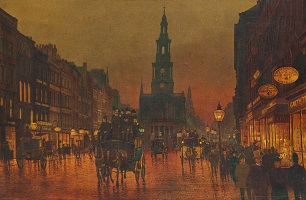
Mary Coleridge (23 september 1861 – 25 augustus 1907)
The Strand, London door John Atkinson Grimshaw, 1899.
Zie voor de schrijvers van de 23e september ook mijn vorige blog van vandsaag.

